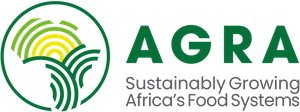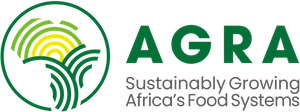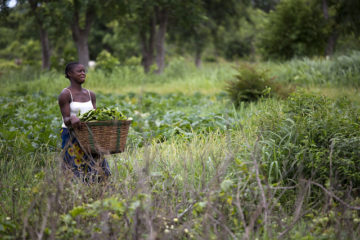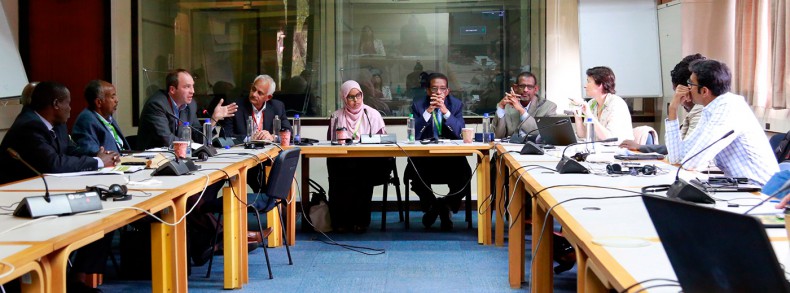In Mali, young rural people find it difficult to borrow funds to start or develop their agricultural activities. This may now change thanks to the Babyloan Mali platform.
The platform enables the Malian community in France to lend even very small amounts to rural micro-entrepreneurs in Mali to help them develop their activities or small business.
The platform was created by Babyloan with the support of the International Fund for Agricultural Development (IFAD). Babyloan is the European leader in online interest free lending. The French NGO Groupe de Recherche et de Réalisations pour le Développement Rural (GRDR) is supporting the initiative by telling migrants in and around Paris about the platform.
Philippe Rémy, IFAD Country Programme Manager for Mali explains how this works and why he believes the initiative should be replicated in other countries.
Could you explain how IFAD and Babyloan work together?
IFAD provides vocational training and entrepreneurship support to young people in Mali to develop profitable and attractive activities in the agricultural sector. The project (known as FIER) works in villages with rural men and women aged 15 to 40 to help them choose their path. During a six month process, the project helps them reflect on their future and identify opportunities.
The project puts a specific emphasis on 15 to 18 year olds – when youth are particularly vulnerable to migration. This is the age where they move to urban centres or abroad with the dream of easy money or, in the case of Mali, to do hazardous work in gold mines. The process helps them think hard about their options and understand there are opportunities at home.
The project also works with boys and girls separately because they face different challenges.
At the end of the six month training, youth have the possibility to choose among a range of training options. Youth over 18 are helped to set up their own economic activities. The project assists them to design their future activity and identify training and funding. They are then linked to micro-finance institutions.
This is where the partnership with Babyloan comes in. It creates a link between the demand – young rural people in need of finance – and Malians living in France who are keen to help their communities at home.
Why is the platform particularly appealing to the Malian diaspora in France?
The Malian diaspora is very generous. But often Malians living France are frustrated because they don’t know what the money they sent back is used for. Is it used for daily needs? Is it spent in the best way? They also keep getting requests for more support
FIER is helping the youth prepare sound and viable projects, and accompanies the implementation of their activities. These projects are presented on the platform and this constitutes a guarantee for the migrants.
With the IFAD project, they know that the funds are used to support small development activities that ensure a better income in the longer term. They know their money will have an impact.
Why is it important to raise funds from the diaspora ?
Remittances sent by Malian workers back to their country are significant. According to IFAD’s latest Sending Money Home Report, remittances from migrant workers from around the world to Mali amounted to US$ 806 million in 2016. The World Bank estimates these remittances could reach US$ 1 billion in 2017. This is significant and represents seven percent of Mali’s GDP. One quarter is from France. Globally around 40 percent of remittances go to rural areas and a large part is used for daily and vital needs such as food, housing, health, but insufficiently in economic and sustainable activities.
Certain Malian communities have been migrating for decades and have been particularly well organised to gather and send money back to their communities from all over the world. I am thinking of the Soninké, for example.
Do you think the platform will be successful?
We already tested the idea and submitted 11 projects. In a two week period, all the projects have been funded. This shows that there is an interest.
In addition, Babyloan and GRDR worked to identify migration patterns in the Koulikoro and Sikasso regions, the first two areas where we have been piloting the concept, and villages which have migrant communities in France. Surveys were conducted in and around Paris to understand the communities solidarity patterns and expectations regarding potential investments and they confirmed their interest in the approach.
What type of investments have been funded already?
| Moussa Diarra |
For example, 26 year old Moussa Diarra needed financing to buy a water pump to grow tomatoes and peppers during the dry season. Through the IFAD funded project he received training in vegetable gardening and was able to borrow about 650 euros through Babyloan. He invested 79 euros from his own funds. The pump will allow him to grow more and sell his surplus.
| Souamé Diarra |
Twenty-two year old Souamé Diarra has been raising goats for the last four years. She wanted to develop a small fattening business and needed 200 euros. She only has 25 euros to invest from her own funds. This money really makes a difference for her and her family.



